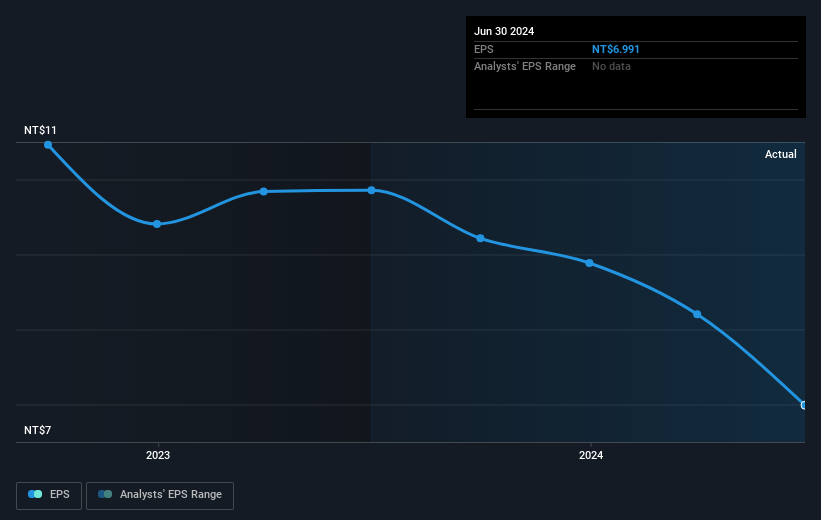Symtek Automation Asia's (TWSE:6438) five-year earnings growth trails the splendid shareholder returns

The worst result, after buying shares in a company (assuming no leverage), would be if you lose all the money you put in. But on the bright side, you can make far more than 100% on a really good stock. For example, the Symtek Automation Asia Co., Ltd. (TWSE:6438) share price has soared 134% in the last half decade. Most would be very happy with that. It's also good to see the share price up 29% over the last quarter.
Since it's been a strong week for Symtek Automation Asia shareholders, let's have a look at trend of the longer term fundamentals.
See our latest analysis for Symtek Automation Asia
In his essay The Superinvestors of Graham-and-Doddsville Warren Buffett described how share prices do not always rationally reflect the value of a business. One flawed but reasonable way to assess how sentiment around a company has changed is to compare the earnings per share (EPS) with the share price.
During five years of share price growth, Symtek Automation Asia achieved compound earnings per share (EPS) growth of 15% per year. So the EPS growth rate is rather close to the annualized share price gain of 18% per year. This indicates that investor sentiment towards the company has not changed a great deal. Indeed, it would appear the share price is reacting to the EPS.
The graphic below depicts how EPS has changed over time (unveil the exact values by clicking on the image).

Dive deeper into Symtek Automation Asia's key metrics by checking this interactive graph of Symtek Automation Asia's earnings, revenue and cash flow.
What About Dividends?
It is important to consider the total shareholder return, as well as the share price return, for any given stock. The TSR incorporates the value of any spin-offs or discounted capital raisings, along with any dividends, based on the assumption that the dividends are reinvested. It's fair to say that the TSR gives a more complete picture for stocks that pay a dividend. We note that for Symtek Automation Asia the TSR over the last 5 years was 192%, which is better than the share price return mentioned above. And there's no prize for guessing that the dividend payments largely explain the divergence!
A Different Perspective
It's nice to see that Symtek Automation Asia shareholders have received a total shareholder return of 56% over the last year. And that does include the dividend. That's better than the annualised return of 24% over half a decade, implying that the company is doing better recently. Someone with an optimistic perspective could view the recent improvement in TSR as indicating that the business itself is getting better with time. It's always interesting to track share price performance over the longer term. But to understand Symtek Automation Asia better, we need to consider many other factors. To that end, you should be aware of the 1 warning sign we've spotted with Symtek Automation Asia .
But note: Symtek Automation Asia may not be the best stock to buy. So take a peek at this free list of interesting companies with past earnings growth (and further growth forecast).
Please note, the market returns quoted in this article reflect the market weighted average returns of stocks that currently trade on Taiwanese exchanges.
New: Manage All Your Stock Portfolios in One Place
We've created the ultimate portfolio companion for stock investors, and it's free.
• Connect an unlimited number of Portfolios and see your total in one currency
• Be alerted to new Warning Signs or Risks via email or mobile
• Track the Fair Value of your stocks
Have feedback on this article? Concerned about the content? Get in touch with us directly. Alternatively, email editorial-team (at) simplywallst.com.
This article by Simply Wall St is general in nature. We provide commentary based on historical data and analyst forecasts only using an unbiased methodology and our articles are not intended to be financial advice. It does not constitute a recommendation to buy or sell any stock, and does not take account of your objectives, or your financial situation. We aim to bring you long-term focused analysis driven by fundamental data. Note that our analysis may not factor in the latest price-sensitive company announcements or qualitative material. Simply Wall St has no position in any stocks mentioned.
About TWSE:6438
Symtek Automation Asia
Designs and manufactures automation equipment and related products in Taiwan.
Flawless balance sheet and slightly overvalued.

